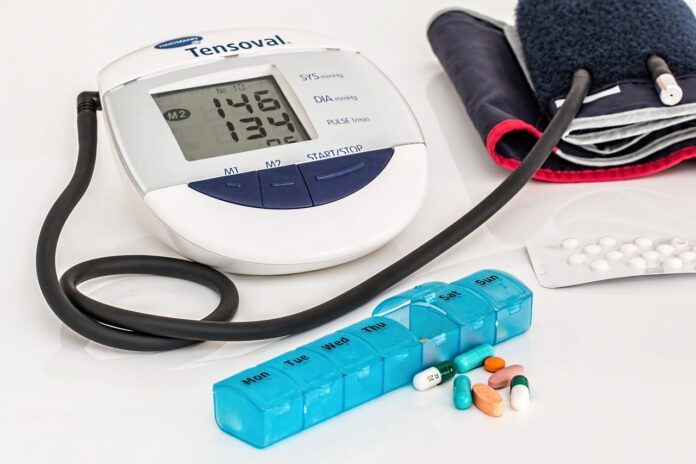Blood pressure is a significant global health concern and a leading risk factor for cardiovascular disease. High blood pressure or hypertension affects more than one billion people worldwide.
It contributes to an estimated 7.5 million deaths each year. To manage hypertension, patients are often prescribed medications such as diuretics, beta-blockers, and ACE inhibitors, which reduce blood pressure and prevent complications associated with hypertension.
Recent research conducted by a team based at the University of Waterloo has revealed that the time of day a patient takes blood pressure medication and their sex may influence the drug’s effectiveness. The study, published in the journal Hypertension, found that the time of day medication can affect how well the body responds to the drug.
The study examined the impact of circadian rhythms, the body’s natural 24-hour cycle, and biological sex on the effectiveness of blood pressure medication. Researchers found that the timing of medication administration can alter the medication’s efficacy, with morning doses being more effective for some patients and evening doses being more effective for others. Additionally, the study found that biological sex can also impact the drug’s effectiveness, with some drugs being more effective in men and others in women.
New research indicates that the efficacy of certain blood pressure medications can be influenced by a patient’s sex and the time of day the drug is taken. The body’s circadian clock and biological sex are important factors in managing blood pressure, as they regulate kidney function and fluid and electrolyte levels.
New research from a team based at the University of Waterloo suggests that the time of day and a patient’s sex may alter the effectiveness of certain blood pressure medications.
Biological sex and the body’s circadian clock are critical factors in managing blood pressure. The circadian clock is a natural, internal process that regulates the sleep-wake cycle and repeats roughly every 24 hours. Among its many other functions, the circadian clock also regulates kidney function. The kidneys play a crucial part in regulating blood pressure by managing fluid and electrolyte levels in the body.
Anita Layton, a professor of Applied Mathematics at Waterloo and the study’s corresponding author, said, “One important class of blood pressure medication is diuretics, sometimes called water pills. Diuretics lower blood pressure by targeting kidney function to increase the amount of urine the body excretes. If they don’t work correctly, they can negatively impact blood pressure.”
Layton’s team used mathematical models to evaluate the effectiveness of various diuretic drugs on kidney function in male and female mice, including loop, thiazide, and potassium-sparing diuretics.
The researchers simulated active and inactive cycles of each mouse’s circadian rhythms. They found that the efficacy of the drugs varied based on the time of day and the sex of the mice. Although humans have opposite circadian clocks, the findings suggest that taking medication at the right time can optimize blood pressure treatment plans.
“Chronotherapy, which is the tailoring of drug administration to match the body’s circadian rhythms, can play a major role in improving modern personalized medicine,” Layton said.
Physiological processes in organisms exhibit daily oscillations known as circadian rhythms. These rhythms are determined by interactions between environmental signals known as zeitgebers and an internal circadian timekeeping system. In mammals, the circadian system has a complex architecture that consists of a central clock and peripheral clocks.
Blood pressure follows a circadian rhythm, with a peak in the early morning and a trough during sleep. Sex differences play a key role in blood pressure regulation, with males developing earlier and more severe hypertension than females.
The kidney, a major regulator of blood pressure, is regulated by the circadian clock, with electrolyte and fluid homeostasis managed through diurnal rhythms. Diuretic medications, commonly used to treat hypertension, target different transporters and have varying effects on males and females at different times of the day.
The study investigated whether the time of day and sex of patients influence the effects of diuretics on urinary sodium, potassium, and volume. It was a randomized controlled trial involving male and female patients with hypertension taking diuretics.
The participants were randomly assigned to four groups based on the time of day when they took the medication, and their adherence was monitored.
The primary and secondary outcomes were measured at baseline and regular intervals using standardized laboratory methods. The data were analyzed using appropriate statistical methods, and the study was conducted in accordance with ethical guidelines and regulations.
The study found that the time of day and sex of patients can influence the effects of diuretics on urinary sodium, potassium, and volume. The results showed significant differences in the natriuretic, diuretic, and kaliuretic effects of diuretics between the morning and evening groups, with more powerful effects observed in the morning group.
Additionally, female patients showed more significant responses to diuretics than male patients in terms of natriuresis and diuresis.
The study highlights the importance of considering the time of day and sex of patients when prescribing diuretics for the treatment of hypertension and other cardiovascular diseases.
In conclusion, the administration time and sex of patients can significantly influence the natriuretic, diuretic, and kaliuretic effects of diuretics. The study found that taking diuretics in the morning may be more effective in producing these effects in both male and female patients, while taking the medication at bedtime may lead to less pronounced effects.
Additionally, the study found that female patients may have a more significant response to diuretics regarding urinary sodium and potassium excretion.
These findings have important implications for the optimal timing and dosing of diuretics in the treatment of hypertension and other cardiovascular disease.
Journal Reference
- Dutta, P., Sadria, etal. Influence of administration time and sex on natriuretic, diuretic, and kaliuretic effects of diuretics. American Journal of Physiology-Renal Physiology. DOI: 10.1152/ajprenal.00296.2022
